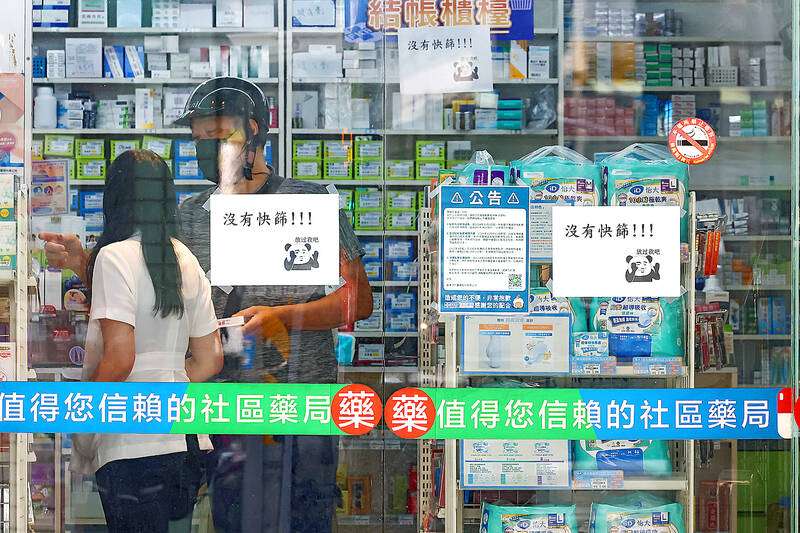The Centers for Disease Control (CDC) yesterday reiterated that Taiwan has sufficient antiviral medication for COVID-19 patients and emphasized the importance of vaccination, amid concerns raised by public figures.
Taiwan has 458,000 courses of Paxlovid, the first-line treatment for eligible COVID-19 patients, 9,900 courses of the second-line alternative molnupiravir and 5,000 courses of the Japan-developed Xocova, which became available last month, the CDC said in a statement.
Taiwan also has 204,000 doses of remdesivir, according to the CDC, which discussed COVID-19 medication inventory on Thursday amid rumors of a shortage.

Photo: CNA
The medications are more than sufficient to meet projected treatment needs during the current surge in COVID-19 cases, as they are prescribed only for patients at higher risk of developing severe illnesses, it said.
The CDC’s statement pushed back against remarks made by Taipei City Councilor Hou Han-ting (侯漢廷), who in a Facebook post the day before questioned the adequacy of the nation’s COVID-19 medication supply.
The Ministry of Health and Welfare projected up to 1.81 million COVID-19 cases and Hou said he wondered whether the 810,000 courses of medication would leave 1 million patients without access to treatment.
The CDC said the ministry estimated up to 1.71 million hospital visits due to COVID-19 between late last month and early this month, not 1.81 million cases.
Only about 20 percent of people who test positive for COVID-19 are prescribed antiviral treatments to prevent severe illness or death, it said, adding that other people receive medication for mild symptoms instead.
The CDC also responded to an op-ed by Taiwan Counter Contagious Diseases Society President Wang Jen-hsien (王任賢), which was published in yesterday’s China Times, where he said the government does not need to promote vaccination when only Moderna’s mRNA-based vaccine is available.
Taiwan has been procuring COVID-19 vaccines from Moderna and Novavax since May 2023, the CDC said, denying claims that it only offers Moderna vaccines.
It is the government’s responsibility to provide evidence-based expert recommendations so the public can make informed decisions about vaccination, it said.
Vaccination is not mandatory, it added.

The Coast Guard Administration (CGA) yesterday said it had deployed patrol vessels to expel a China Coast Guard ship and a Chinese fishing boat near Pratas Island (Dongsha Island, 東沙群島) in the South China Sea. The China Coast Guard vessel was 28 nautical miles (52km) northeast of Pratas at 6:15am on Thursday, approaching the island’s restricted waters, which extend 24 nautical miles from its shoreline, the CGA’s Dongsha-Nansha Branch said in a statement. The Tainan, a 2,000-tonne cutter, was deployed by the CGA to shadow the Chinese ship, which left the area at 2:39pm on Friday, the statement said. At 6:31pm on Friday,

The Chinese People’s Liberation Army Navy’s (PLAN) third aircraft carrier, the Fujian, would pose a steep challenge to Taiwan’s ability to defend itself against a full-scale invasion, a defense expert said yesterday. Institute of National Defense and Security Research analyst Chieh Chung (揭仲) made the comment hours after the PLAN confirmed the carrier recently passed through the Taiwan Strait to conduct “scientific research tests and training missions” in the South China Sea. China has two carriers in operation — the Liaoning and the Shandong — with the Fujian undergoing sea trials. Although the PLAN needs time to train the Fujian’s air wing and

The American Institute in Taiwan (AIT) put Taiwan in danger, Ma Ying-jeou Foundation director Hsiao Hsu-tsen (蕭旭岑) said yesterday, hours after the de facto US embassy said that Beijing had misinterpreted World War II-era documents to isolate Taiwan. The AIT’s comments harmed the Republic of China’s (ROC) national interests and contradicted a part of the “six assurances” stipulating that the US would not change its official position on Taiwan’s sovereignty, Hsiao said. The “six assurances,” which were given by then-US president Ronald Reagan to Taiwan in 1982, say that Washington would not set a date for ending arm sales to Taiwan, consult

A Taiwanese academic yesterday said that Chinese Ambassador to Denmark Wang Xuefeng (王雪峰) disrespected Denmark and Japan when he earlier this year allegedly asked Japan’s embassy to make Taiwan’s representatives leave an event in Copenhagen. The Danish-language Berlingske on Sunday reported the incident in an article with the headline “The emperor’s birthday ended in drama in Copenhagen: More conflict may be on the way between Denmark and China.” It said that on Feb. 26, the Japanese embassy in Denmark held an event for Japanese Emperor Naruhito’s birthday, with about 200 guests in attendance, including representatives from Taiwan. After addressing the Japanese hosts, Wang